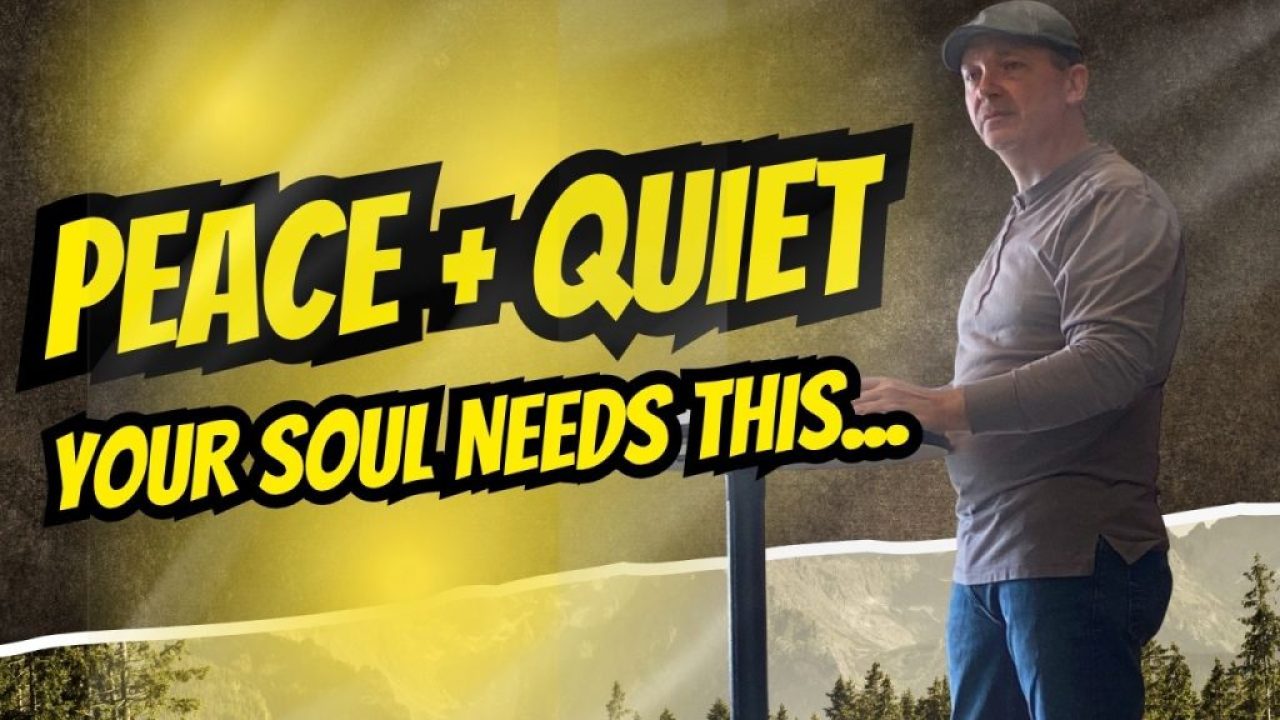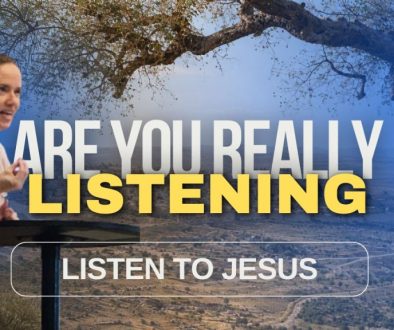Finding the Secret Place: How Jesus Practiced Solitude and Why You Need It
🕊️ Do As I Do, Part 5 — Solitude: Finding the Secret Place
We all feel it — the constant noise, the notifications, the hurry, the crowds.
Our world hums with distractions that keep our souls restless and our minds captive.
But Jesus offers something radically different:
An invitation to step away.
To be alone with Him — not to escape the world, but to be renewed for it.
“Come with me by yourselves to a quiet place and get some rest.”
— Mark 6:31 (NIV)
Through solitude, we are invited into Jesus’ rhythm of retreating from the noise to be fully present with the Father, and then returning to love and serve others.
🌿 Why Jesus Chose Solitude
Jesus made solitude a priority.
In a world full of need, pressure, and opportunity, He consistently withdrew to lonely places to pray.
Luke 5:16 (NIV)
But Jesus often withdrew to lonely places and prayed.
Jesus often went to solitary or deserted places to commune with God.
This wasn’t avoidance — it was alignment.
It was a deliberate choice to escape the demands of ministry and people so He could receive spiritual guidance, power, and rest.
If Jesus needed that space, so do we.
Solitude demonstrates priorities — it shows what matters most.
🔄 The Rhythm of Retreat and Return
Solitude was never a one-time act for Jesus; it was His rhythm of life.
Like breathing in and out, He practiced a pattern of retreat and return.
Matthew 14:22–23 (NIV)
Immediately Jesus made the disciples get into the boat and go on ahead of him to the other side, while he dismissed the crowd. After he had dismissed them, he went up on a mountainside by himself to pray. Later that night, he was there alone.
He sent His disciples ahead so He could withdraw in solitude.
Later, He returned to continue His mission.
This rhythm — inhale with God, exhale into the world — sustained everything He did.
🌤️ When Jesus Invited His Disciples to Rest
Even the disciples, busy with ministry and service, were invited to this same rest.
Mark 6:30–32 (NIV)
The apostles gathered around Jesus and reported to him all they had done and taught. Then, because so many people were coming and going that they did not even have a chance to eat, he said to them, “Come with me by yourselves to a quiet place and get some rest.” So they went away by themselves in a boat to a solitary place.
Jesus didn’t say, “Work harder” — He said, “Come away.”
He understood that spiritual strength flows from spiritual stillness.
Without time alone with the Father, even good things eventually become draining things.
🕯️ The Foundation of Spiritual Life
Henri Nouwen once wrote:
“Without solitude, it is virtually impossible to live a spiritual life.”
Solitude is foundational because it roots every other practice — prayer, Sabbath, fasting, and service — in love rather than performance.
Yet solitude isn’t always easy. It can be deeply refreshing, but it can also feel like painful emotional surgery.
When we slow down, the things we’ve buried — grief, regret, fear, anger — begin to rise to the surface.
But God brings these things up not to wound us, but to heal us.
In solitude, God forms us into the people He has always desired us to become.
⚔️ The Battles of the Soul
In solitude, we face the same three enemies that Scripture names again and again:
- The world — the noise and distractions that keep us from hearing God.
- The flesh — the restless desires that crave control and comfort.
- The devil — the deceiver who distorts truth.
But solitude is where truth starts to win.
When the noise dies down, the voice of God becomes clear again.
🤼♂️ Wrestling with God
Solitude isn’t always serene — sometimes, it’s a wrestling match.
One of Scripture’s most profound encounters in solitude happened with Jacob.
Genesis 32:22–30 (NIV)
That night Jacob got up and took his two wives, his two female servants and his eleven sons and crossed the ford of the Jabbok. After he had sent them across the stream, he sent over all his possessions. So Jacob was left alone, and a man wrestled with him till daybreak. When the man saw that he could not overpower him, he touched the socket of Jacob’s hip so that his hip was wrenched as he wrestled with the man. Then the man said, “Let me go, for it is daybreak.”
But Jacob replied, “I will not let you go unless you bless me.”
The man asked him, “What is your name?”
“Jacob,” he answered.
Then the man said, “Your name will no longer be Jacob, but Israel, because you have struggled with God and with humans and have overcome.”
Jacob said, “Please tell me your name.”
But he replied, “Why do you ask my name?” Then he blessed him there.
So Jacob called the place Peniel, saying, “It is because I saw God face to face, and yet my life was spared.”
Jacob’s story is a reminder that solitude may not always feel peaceful.
Sometimes, it feels like a fight — a fight with fear, with guilt, with God Himself.
But notice: Jacob left that encounter limping… and blessed.
The limp became a reminder of grace — that in weakness, he had met the living God.
🕰️ Steps to Practicing Solitude
Solitude rarely happens by accident; it must be chosen intentionally.
Here are simple, practical steps to begin cultivating this rhythm:
- Schedule Time and Place
Select a consistent time and a quiet location free from interruptions. Make it part of your daily rhythm. - Eliminate Distractions
Turn off your phone. Silence notifications. Let your family or coworkers know you’ll be unavailable for a short time. - Start Small
Begin with 15–30 minutes. It doesn’t need to be hours — just a moment of intentional presence. - Set a Timer
Use a timer so you’re not tempted to check the clock. This helps your mind settle. - Focus Your Attention
You might focus on your breathing, a short verse, or simply the beauty of your surroundings.
Let your attention rest on God. - Observe and Accept
When thoughts or emotions arise, don’t fight them. Acknowledge them and gently return to your focus.
Solitude is not about perfection — it’s about presence.
🌤️ The Rewards of Solitude
What happens when you actually make space for solitude?
- Self-Reflection: You become aware of your inner life — your motives, wounds, and longings.
- Spiritual Growth: You begin to hear God’s voice with clarity.
- Peace and Calm: Studies — and Scripture — show that stillness reduces anxiety and renews strength.
- Identity: You remember who you truly are — a beloved child of God, not defined by productivity or approval.
Solitude restores what hurry steals.
🌿 The Secret Place
Jesus spoke clearly about solitude in His teaching on prayer:
Matthew 6:6 (NKJV)
“But you, when you pray, go into your room, and when you have shut your door, pray to your Father who is in the secret place; and your Father who sees in secret will reward you openly.”
The “secret place” isn’t necessarily a physical room — it’s a posture of the heart.
It’s any space where you can be honest, unguarded, and still before God.
This might be:
- A park bench at sunrise 🌅
- A quiet walk after work 🚶♂️
- A fishing spot 🎣
- Your bedroom late at night 🌙
- Even a locked bathroom if that’s the only quiet spot available 🚪
The place isn’t sacred — His presence is.
💬 Why We Resist Solitude
Even though we long for peace, many of us avoid solitude.
We fill every gap in the day with noise or movement.
Underneath, there’s a deeper battle happening — a push-pull dynamic of the heart.
Part of us desires God and His will.
Another part of us resists Him — wanting to rule our own kingdom.
We say:
“I’m too busy.”
“I’ll pray when I have time.”
“I just can’t slow down.”
But busyness is one of the enemy’s most effective weapons.
Hurry keeps us from hearing the voice that matters most.
We must ruthlessly eliminate hurry from our lives.
The stakes are high — peace or exhaustion, presence or burnout, life or death of the soul.
🎸 Less Is More
In the 1980s, Gibson Guitars ran an ad for their Les Paul model that said,
“Les is more.”
That phrase captures a profound spiritual truth.
When we simplify — when we do less, hurry less, scroll less — we begin to notice more.
More peace.
More awareness.
More of God.
Less noise, more presence.
Less striving, more surrender.
Less distraction, more delight.
🔥 The Fruit of Solitude
Solitude isn’t about escape; it’s about empowerment.
When you retreat with God, you return refreshed and ready to love.
Through solitude we:
- Heal from inner wounds.
- Hear God’s voice more clearly.
- Gain spiritual strength to stand against the enemy.
- Learn to love from overflow rather than exhaustion.
Without the quiet, our spiritual lives wither.
But with it, we come alive to the greatest joy of life — a familiar friendship with Jesus.
💛 Find the Quiet — Find God
Each of the spiritual practices — Sabbath, prayer, fasting, solitude — is designed to keep us connected and aligned with the heart of the Father.
As we make space for the secret place, our souls begin to wake up.
A holy flame starts to burn again.
And in that flame, we rediscover what Jesus meant when He said:
“Come and see.”
— John 1:39 (NIV)
He invites you not just to believe in Him, but to be with Him.
In the quiet.
In the secret place.
In the stillness where His love restores your soul.
So find your secret place — wherever that may be — and go there often.
Fall in love with it.
Fall in love with Him.
Because when you find the quiet,
you’ll find God.




